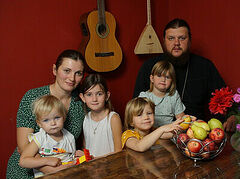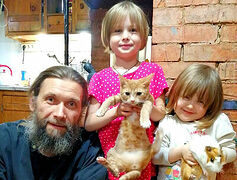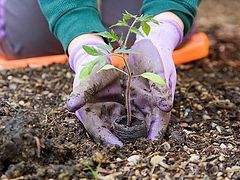The biologists Alexander and Maria Popov, the parents of nine children, gave up their careers and moved to the country to create the most favorable conditions for a Christian upbringing of their children. The couple gave the interview via visual communication together, but from different places: Alexander from the village, and Maria from the hospital where she had given birth to their ninth child the day before.
 The Popovs. Discharge from the hospital, October 2021
The Popovs. Discharge from the hospital, October 2021
-
Alexander Popov, thirty-nine. A farmer, an online biology teacher for home-schooled children, a biologist. Graduated from the Biology Department of Moscow State University where he met his future wife. In the fourth year their first child was born. This was followed by postgraduate studies and work at the department for ten years.
-
Maria Popova, thirty-eight. A neurophysiologist. Graduated from the Biology Department of Moscow State University, entered postgraduate school, worked as a researcher at the Institute of Higher Nervous Activity and Neurophysiology of the Russian Academy of Sciences for about ten years. Her studies and work stopped after the birth of the fifth child.
They have been married for eighteen years.
Children:
Sergei, sixteen
Alexei, fourteen
Tikhon, twelve
Stepan, ten
Katerina, eight
Pavel, five
Irina, four
Roman, two
Cassian, two days
—Why did you decide to give up your careers?
Alexander: We were lucky to work with real scientists. But looking at my colleagues, I realized that I wasn’t quite in my place, that the results of my scientific activity were modest, and I ought to try something else. It also became difficult because scientific work was becoming bureaucratized, and I was tired of filling out papers. Maria and I decided to move to the country.
Maria: We worked in different places. I liked neurophysiology, but I had to choose between family and work. Up until the arrival of the fifth child I combined them, but I felt that I was neglecting my family. We were doing an important thing for humanity: studying the mechanisms of degeneration in the brain for the early diagnosis and prevention of various illnesses. But on reflection, I realized that my work would go on without my participation, while the family couldn’t do without me. My administration also suffered because I was constantly on maternity leave.
A.: Maria’s postgraduate studies took ten years instead of three due to frequent childbirth.
—When you both quit your jobs, weren’t you afraid that you would be left without a livelihood?
A.: Whatever you do, the pay will never be as low as it is in the university. Although now the situation is better in Moscow universities.
Initially we had the idea of starting a farm, which would become one of our main sources of income. We set ourselves two tasks: to master agriculture and homeschool our children. Each task is difficult, but together they are overwhelming. We made acquaintances who needed help in developing curricula and aids for homeschooling. Our academic knowledge came in handy, and it helped us financially, since our farm at first was not as successful as we had expected.
M.: Our new way of life made us look for new sources of income. Fortunately, we didn’t have to invent anything complicated.
—How did you choose the place to which you moved?
A.: We moved to a village near Uglich in the Yaroslavl region. Our relatives lived in a neighboring village, and we enjoyed visiting them. We had wanted to buy a dacha in the area. When we bought a house, we didn’t think that we would live in it permanently.
M.: It’s wonderful there: a dense forest, the large, beautiful Volga River, and year-round road access to the village. And it’s not very far from Moscow where our relatives are still living.
 Alexander and Maria A.: In 2015, we finally moved with our five children to our house near Uglich. We were prepared for the move, because long before we had felt the urge to change our way of life. We had friends who already settled a while ago in a remote village of the Tver region. We would come to visit them and encourage them to do agricultural experiments. “Let’s buy a bull, try to butcher it and sell the meat. Or, let’s pick cranberries and sell them.” All this was costly, unprofitable and beyond our strength, but it gave us some experience. When we moved, we had an idea of what we shouldn’t do to save resources. We decided to breed pheasants and sell them to hunting farms. Pheasants are released to increase the amount of game for hunters. A little later we began to breed broilers for meat. It’s profitable in our region to grow anything and sell it to Moscow. There is a huge demand in Moscow, and if you care about the quality of your produce, it’s eagerly snapped up.
Alexander and Maria A.: In 2015, we finally moved with our five children to our house near Uglich. We were prepared for the move, because long before we had felt the urge to change our way of life. We had friends who already settled a while ago in a remote village of the Tver region. We would come to visit them and encourage them to do agricultural experiments. “Let’s buy a bull, try to butcher it and sell the meat. Or, let’s pick cranberries and sell them.” All this was costly, unprofitable and beyond our strength, but it gave us some experience. When we moved, we had an idea of what we shouldn’t do to save resources. We decided to breed pheasants and sell them to hunting farms. Pheasants are released to increase the amount of game for hunters. A little later we began to breed broilers for meat. It’s profitable in our region to grow anything and sell it to Moscow. There is a huge demand in Moscow, and if you care about the quality of your produce, it’s eagerly snapped up.
—What problems did you have to solve during the move?
M.: In 2015, our three older children went to school. Health care, which is often lacking in the provinces, was not relevant to us since in Moscow we have doctors we can always turn to. But the situation with school was unclear. We had a very good school in Moscow. Then we learned that homeschooling is fully legal. This was the last argument in favor of the move.
A.: When we moved, there had no internet in the village yet. We bought special equipment and set up internet. The Electronic School of Russia project had just been launched, where lessons in all subjects of the school curriculum were digitized.
M.: All our children are certified once a year at the Moscow school we are attached to. This is done from home, so we don’t go there; we determine their timetables, the distribution of the study load and everything else. We’ve combined the homeschooling curriculum with the school curriculum, and we like it.
—Do your children do well in their studies?
A.: Our oldest son has passed the OGE (Main State Exam) and entered college at the Moscow Institute of Physics and Technology.
M.: He didn’t want to study at home. We strove to ensure that children learn independently. But Sergei got used to the fact that teachers decided all questions, and after six months of homeschooling he said: “I can’t bring myself to do anything. You’re adults, so make me do my homework!” We answered that we didn’t want to force anyone. At school, he had A and B grades, but only thanks to the teachers’ efforts; he was swimming with the tide. He will have to live with it now. The other children managed to reorganize, but they had spent less time in the system. Nevertheless, the oldest son now studies with pleasure. Apart from him, no one wants to travel to school anymore.
—You’re so young, and you already have nine children. Was it a conscious choice?
A.: We decided before our wedding that we would have many children.
M.: I thought this was the most important thing I should ask my future husband about.
A.: I had always wanted to have many children. There were three of us siblings in our family, and in Maria’s family too. We grew up in the 1990s. There were few Orthodox people in our circle, the pressure of the environment was palpable, and I wanted a large family as my micro-society in which children could feel comfortable. My parents were biologists, both non-believers, but my mother converted when I was five. Once we went on a hike with my parents, and I complained that it was hard for me to walk. My mother said: “There is God; ask Him and He will help you.” I didn’t have any doubts that it was true.
M.: My parents were interested in the Orthodox faith, but they weren’t integrated in Church life. For some time my brothers and I attended a Sunday school. When Alexander and I met, I asked him how he imagined a family. We discussed what it would be like. But I wondered if God would bless our future marriage. We went to Alexander’s spiritual father, and he said that we should get married.
—Many parents are afraid that they won’t be able to provide for a large family, and their children will have wear second-hand clothing.
A.: Our children constantly wear second-hands.
M.: They like second-hands.
A.: We are surrounded by kind people; whenever they see our children, they give us clothes.
M.: Our children put on these clothes and go to the farm to busy themselves with chickens, dogs, cows and geese. Second-hands are a necessary thing in our household!
A.: Active village life spoils clothes instantly... The financial issue is serious. But here I can say two things. First, every time you think, “We already have three children. Can we manage another one?” it appears that we can. And after the sixth or seventh there is no noticeable difference.
M.: Our relatives help us as much as they can!
A.: The second point: We came to the conclusion that raising children in over-sufficiency can be harmful for them. In the 1990s, there were many examples of families living in poverty. By the end of the 1990s some found good jobs, others opened their businesses, and the situation was getting better. We saw that younger children who were born and raised in well-off families lose out in comparison to children who grew up in poverty. At the beginning of our family life, Maria and I discussed how to make sure that our children didn’t make out that our financial situation was good.
M.: The children are well-dressed and fed, abd they have a lot of toys. We thought: what difficulties could make our children develop into good people? What difficulties will they have if they have everything? How should we give them a Christian upbringing?
A.: Children cannot be deceived. We were taught in childhood that we should conserve bread. So how can we explain this to a modern child if bread costs, say, thirty rubles, and I have 30,000 rubles in my wallet? At first we tried to artificially limit our wealth; but then there were a lot of children, there was less money, and everything worked out by itself.
We realized that such a large family cannot have only one source of income. We need several independent sources of money. For example, if the sale of organic farm food isn’t going well, the second and third sources will save the situation.
—Did the move serve educational purposes as well?
M.: We tried to make our children work all the time: chop firewood, carry water, and grow vegetables so they would have physical activity that is useful for the family and not just physical development. As the children grew, these tasks were no longer enough. If you live at your dacha for three months and then come back to the city, you again lie down and say, “Oh, I’m so busy, I’m doing my homework!” It’s a constant struggle with your way of life. The move helped us complicate our living conditions, though our house is well equipped. But there are many things to do with the household, and the children see that their work is needed. If you don’t feed the pheasants, they will die, and we won’t be able to buy bread. Now we regret only one thing: that we didn’t move earlier.
A.: For us, the success of rural life isn’t the number one priority—family and children come first. Actually, we are city people. I am a zoologist by profession, and I traveled a lot in my life and lived in difficult conditions. I believed I could do everything in the village, but it turned out that I could hardly do anything. This is normal for a city dweller who has moved to a village. It takes several years only to learn how to solve basic everyday tasks.
M.: Although we tried to get to know rural life by visiting our friends who had moved earlier, our reality was different. No matter how much we prepared theoretically: theory is theory, but life is another thing. It was very hard for us. It’s sometimes hard, but it all depends on how honestly you formulate your goals. If we had moved to the country to live easily and happily, we would have suffered the ruin of our hopes, and after a couple of years with curses we would have returned home. If we had set the goal of starting a super-successful business, we would have been disappointed and come back to the city with debts. And if our goal is to create an environment conducive to raising children, in the village it is easier to find appropriate instruments for its implementation. There is more freedom compared to the city; there are no problems with living space—you can build a house of whatever size you want.
The fact that we are at some distance from society gives a certain freedom—we have almost no neighbors who would be bothered by something we do. We have a beautiful church in the neighboring village, and the children enjoy walking the three miles to get there. With God’s help we’re trying to solve the specific task set by ourselves. Whether we have succeeded will become clear when the children grow up.
—You give the impression of a family of which it is said, they twain shall be one flesh (Mk. 10:8). Is this unanimity a gift from God, or the fruit of serious work?
A.: We’ve had difficulties in our relationship, but we overcame most of them before the wedding thanks to Maria. She loves to talk about everything. At first I could hardly bear it, but gradually I got used to it. It is important to talk about everything, discuss both pleasant and unpleasant things. People tend to underestimate dialogue and consider it useless.
 In our Church of the Resurrection of Christ
In our Church of the Resurrection of Christ
M.: Mutual understanding between spouses is, of course, God’s gift, but also take a huge amount of work. We are often told, “Oh, so-and-so is lucky to have such a spouse!” But I disagree. Luck is when something has happened by itself. But we do long and difficult work on a common, important cause. At some point, families inevitably face disunity. And we have had such moments. This is one of the reasons why we decided to move. We felt that we all had different lifestyles. Father had his own job, mother had her own, the children had their own activities, and in the evening we just dined together. We spent too much time on our personal lives, separate from the family, which pulled us in different directions. For some it’s okay to live like this, but we wanted our family to become a single unit. How can you raise your children if they live their own lives? Our way of life should work for the tasks that we consider vital. The modern world is working against family, and you have to invent something to create your own line and stick to it. We don’t want to isolate ourselves from the world! We’re just solving our problems.
A.: Unfortunately, people teach their children that work and career come first. But this is done at the expense of the family and relationships. If my wife feels that work is more important to me than family relations, she won’t trust me. We were brought up this way, and our peers educate their children this way. We are told that you should build your career and fulfil yourself, and someone will probably walk “by your side” with you through life. But this is out of keeping with our view of family as a small Church. Here we need more unity.
Now almost everything has changed: traveling, expensive cars, good apartments, excellent health care are available to modern people, and they actively make use of this. However, the idea of the family has remained the same, just as it was in the sad twentieth century. A large family seems to be inaccessible to the modern young person. But we believe that that isn’t true. These stereotypes can be overcome. If your dreaming of a big family know that it won’t be easy, but you shouldn’t wait for a more convenient and suitable moment—today is the best time to be happy.






